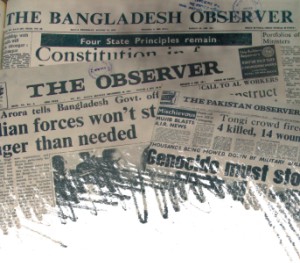Reflections
The death of a Newspaper
Syed Badrul Ahsan

The death of a newspaper epitomises the end of some of the more stirring times we have gone through. It is the end of a beautiful experience. It is the sunset that will not give rise to a new dawn. And that precisely is the way I feel about the slow, agonising death of the Bangladesh Observer. It is pointless to ask today if it could not have been saved, indeed if it could not have been resuscitated. Time, destiny and the workings of the mind in some men have done their worst. Today, decades after it first made its way into our lives as the Pakistan Observer in 1949, the newspaper dwindles fast into a memory of the way we were, for years on end.
My earliest recollection of the Observer goes back to 1961, when I scoured the newspaper for morsels of information on the visit of Queen Elizabeth II and Prince Philip to Dhaka. My hold on English was abysmal at the time, considering that I was in kindergarten. But the Pakistan Observer did carry pictures of the royal couple and in doing so made an impression on me. Children are fascinated by fairy tales; and here was the Observer telling me of a living tale of kings and queens. That was in the days of Ayub Khan. It would not be until Yahya Khan let the marauding Pakistan army loose on Bengalis in March 1971 that I would get to read the Observer again. The times were depressing. In early April of that year, despondent over the turn politics had taken in the country, I made my way to the Quetta divisional library in distant Baluchistan and suddenly stumbled on copies of some recent issues of the Pakistan Observer. The fact that the newspaper had come all the way from Dhaka was good enough for me, even if it brought gloomy news. There were pictures of General Tikka Khan and General Niazi, accompanied by reports of how 'successfully' the army was beating back the 'miscreants' and 'secessionists' and restoring normalcy in East Pakistan.
In the course of the year I would, of course, get to read the Observer on a more regular basis. My family shifted to Dhaka in July and between then and December it was in occupied Bangladesh that I read the newspaper. Editor Abdus Salam's critical pieces on Bangabandhu did not exactly make us happy, for obvious reasons. But I was thrilled to read write-ups from Syed Naquib Muslim who, I am glad to say, I would get acquainted with decades later through his reviews and literary articles for The Daily Star. On 18 December 1971, the Observer appeared with a new masthead. The word 'Pakistan' had been crossed out so that the masthead now read only as The Observer. Early in 1972, convinced that I was a budding poet in the English language, I made my way to the Bangladesh Observer office with a sheaf of pages I thought contained hauntingly beautiful poetry. I wanted, naively, to meet the editor. In the event, it was a sub-editor who took one look at my poems before telling me I needed to do better and advising me to come back later. Broken-hearted, I left the place. Poetry did not matter any more.
I was not to return to the Bangladesh Observer office until June 1995, when Iqbal Sobhan Chowdhury, then executive editor of the newspaper and an individual I have always respected (and the last editor of the newspaper), took me on board as assistant editor. It was an exciting moment, for a couple of reasons. The first was that the editor was Professor K.M.A. Munim, who had been my teacher at the English department of Dhaka University. The second was that, having earlier worked for two English language newspapers, I considered my entry into the Observer a coming of age for myself. There were the wonderful colleagues I found there -- Mashuqul Haq, Nerun Yakub, Abdul Gofran, Syed Zillur Rahman, M. Ashraf Ali and a whole host of others -- with whom I shared thoughts and laughter and endless cups of tea. The Observer was certainly not going through the best of times, but that did little to dampen the enthusiasm with which we worked. It was the Observer and the Observer was part of history. What more could we ask for? There was the library where I spent days going through old issues of the Pakistan Observer. It was essentially a going back to old times in order to make sense of the new. It was like stepping on the stones that led, one after the other, to a landscape of history.
Our world is a less vibrant place without the Bangladesh Observer. For many of us, it was the place where we first comprehended the calling of professional journalism. Working for it was a badge of honour we wore with pride. When it died, or when it was subjected to euthanasia, something died in all of us.
Copyright
(R) thedailystar.net 2009 |
